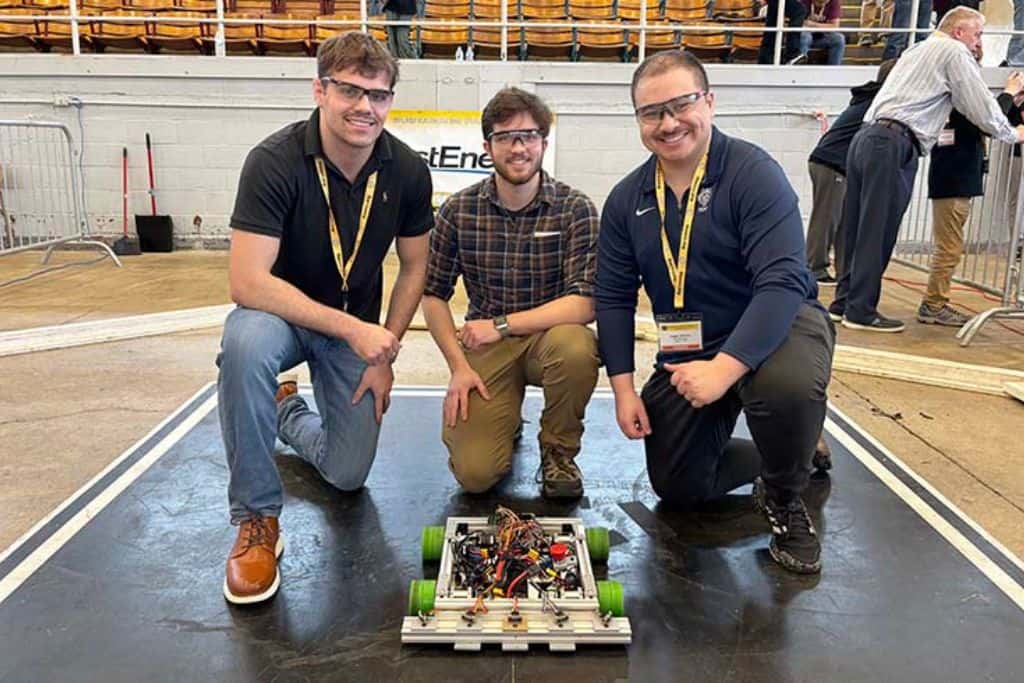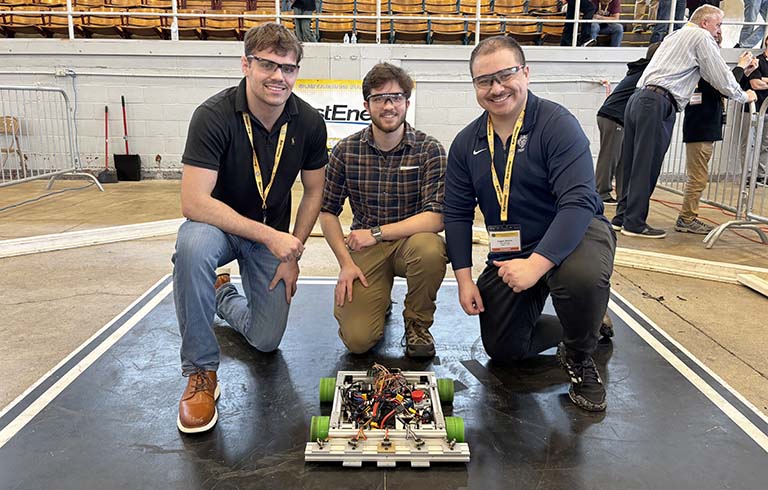Trine University Triumphs at National Robotics Challenge Sumo Robot Competition


Sumo Robot Domination: Trine’s Championship Strategy
Trine University’s computer and electrical engineering students recently showcased their exceptional skills by winning the Sumo Robot competition at the National Robotics Challenge held in Marion, Ohio. The team, comprised of Malachi Henry, Philip Burney, and Logan Martin, demonstrated a strategic blend of programming prowess and adaptability, overcoming mechanical challenges to secure a decisive victory.
Strategic Design and Programming for Sumo Robot Success
The Trine team’s sumo robot, designed to autonomously force opponents out of a ring, may not have boasted the most advanced hardware. However, the students leveraged their expertise in computer and electrical engineering to develop sophisticated software that gave them a significant edge. This strategic focus on programming allowed them to outmaneuver teams with more mechanically complex robots but less refined control systems.
The team’s commitment to meticulous programming and testing was evident in their preparation for the competition. They spent weeks fine-tuning the robot’s movements in Hershey Hall, ensuring precise control and responsiveness. This dedication proved crucial in the high-pressure environment of the competition.
Adapting to Challenges: Real-World Engineering Problem-Solving
The National Robotics Challenge provided Trine’s engineering students with invaluable experience in real-world problem-solving. The Sumo Robot competition presented a unique set of challenges, requiring the team to adapt their strategies on the fly. Recognizing a weakness in their robot’s initial design, they quickly modified the front ram to lower its center of gravity, preventing opponents from gaining leverage. This ingenuity and adaptability enabled them to overcome mechanical limitations and secure a 5-1 victory in the round-robin tournament.
Beyond Sumo: Trine’s Combat Robot Team Gains Valuable Experience
In addition to the Sumo Robot competition, Trine University also fielded a team in the Combat Robot division. This team, consisting of Alex Gansert, Benton Knox, Jamie Le, Mia Woods, and Porter Galvan, gained valuable hands-on experience in robotics design, fabrication, and problem-solving. Despite facing challenges with their primary robot, they demonstrated resilience by utilizing a backup and showcasing a strong understanding of engineering principles.
Learning and Growing Through Robotics Competition
While the combat robot team didn’t achieve the same level of success as their sumo counterparts, the experience proved invaluable for all involved. The team learned to navigate complex design challenges, troubleshoot technical issues, and adapt to unexpected setbacks. This practical experience complements Trine University’s strong engineering curriculum, preparing students for successful careers in a rapidly evolving field.
Trine University: Fostering Engineering Excellence
Trine University’s success at the National Robotics Challenge highlights the institution’s commitment to providing a high-quality engineering education. By emphasizing hands-on learning, problem-solving skills, and real-world application, Trine equips its students to excel in the dynamic field of robotics and beyond. The experience gained at competitions like the National Robotics Challenge reinforces classroom learning and provides students with a competitive edge in their future careers.
Inspiring the Next Generation of Engineers
The achievements of Trine University’s robotics teams serve as an inspiration to aspiring engineers. The dedication, ingenuity, and teamwork displayed by these students demonstrate the power of a strong engineering education. Trine University continues to foster a learning environment that encourages innovation, collaboration, and a passion for engineering excellence.
Learn More About Trine University’s Engineering Programs
Explore Trine University’s respected engineering programs and discover how you can build the skills and knowledge needed to succeed in this dynamic field. To learn more about programs, faculty, and opportunities, reach out to Studygram for personalized guidance and support with your application.
Visit our website to explore universities, programs, and everything you need to start your educational journey in the United States with Studygram’s expert support.

